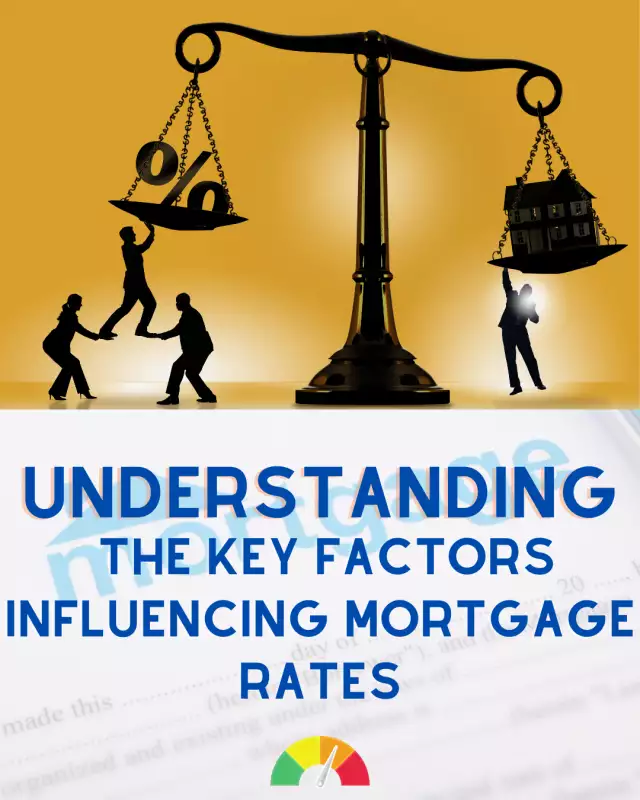Understanding the Key Factors Influencing Mortgage Rates, from Inflation and Economic Growth to Global Events
Understanding the Key Factors Influencing Mortgage Rates, from Inflation and Economic Growth to Global Events
Mortgage ratesare an essential component of the home-buying process.They determine the amount of interest you pay on your home loan, and ultimately, the overall cost of your home. However, many homebuyers may not understand how mortgage rates are determined. In this post, we'll discuss the factors that impact mortgage rates, including inflation, economic growth, and global events.
Inflationis a critical factor that impacts mortgage rates. The relationship between inflation and interest rates is direct - as inflation increases, interest rates tend to increase, and as inflation decreases, interest rates tend to decrease. This is because lenders need to charge higher interest rates to make up for the loss in purchasing power caused by inflation. Conversely, if inflation is low, lenders can charge lower interest rates since the purchasing power of the loaned money is relatively stable. In the United States, the Federal Reserve manages inflation through its monetary policy. The Fed may increase interest rates to combat inflation, which can lead to higher mortgage rates. For example, in 1980, the inflation rate in the United States was 13.5%, leading to mortgage rates of nearly 20%.
Economic growthis another significant factor that impacts mortgage rates. When the economy is growing, people tend to have more money to spend, leading to an increase in consumer spending. This increase in demand can lead to higher prices, which can lead to higher inflation. To combat inflation, the Federal Reserve may increase interest rates, leading to higher mortgage rates. On the other hand, during periods of economic recession or slow growth, the Federal Reserve may lower interest rates to stimulate economic growth, leading to lower mortgage rates. For example, during the 2008 financial crisis, the Federal Reserve lowered interest rates to near zero to stimulate economic growth and keep mortgage rates low.
Global eventscan also impact mortgage rates. For example, during the COVID-19 pandemic, the Federal Reserve cut interest rates to near zero to stimulate economic growth and keep mortgage rates low. Conversely, global events such as rising oil prices or inflation in other countries can lead to higher mortgage rates. The impact of global events on mortgage rates can be unpredictable and can change rapidly. Therefore, it's essential to keep an eye on current events and their potential impact on mortgage rates.
In addition to inflation, economic growth, and global events, several other factors impact mortgage rates. The housing market is a crucial factor that impacts mortgage rates. A strong housing market can lead to lower mortgage rates due to increased competition among lenders. A weak housing market can lead to higher mortgage rates due to decreased demand for mortgages. A credit scoreis another essential factor that impacts mortgage rates. A higher credit score indicates a lower risk for lenders and can lead to lower mortgage rates. Loan duration and down payment are also important factors that impact mortgage rates. A shorter loan duration can lead to lower mortgage rates because the lender takes on less risk. A higher down payment can lead to lower mortgage rates because it indicates a lower risk for the lender.
To get the best mortgage rates, it's essential to shop around and consider different loan options. It's also important to improve your credit score, increase your down payment, and consider a shorter loan duration if possible. By understanding the factors that impact mortgage rates and taking steps to improve your financial situation, you can save thousands of dollars over the life of your mortgage.
Q&A
Q: What is the current average mortgage rate in the United States?
A: Mortgage rates can vary depending on several factors, including the borrower's credit score, loan duration, down payment, and the lender's policies. As of March 2, 2023, the average 30-year fixed mortgage rate in the United States is around 3.5%, but this can vary depending on the lender and other factors.
Q: How can I improve my chances of getting a lower mortgage rate?
A: There are several steps you can take to improve your chances of getting a lower mortgage rate, including improving your credit score, increasing your down payment, and shopping around for different loan options. Additionally, you may want to consider a shorter loan duration, which can lead to lower mortgage rates.
Q: What impact do global events have on mortgage rates?
A: Global events such as rising oil prices or inflation in other countries can impact mortgage rates. However, the impact of these events can be unpredictable and can change rapidly. It's important to keep an eye on current events and their potential impact on mortgage rates.
Q: How do lenders determine mortgage rates?
A: Lenders determine mortgage rates based on several factors, including inflation, economic growth, global events, the housing market, the borrower's credit score, loan duration, and down payment. Lenders may also consider their own policies and financial goals when setting mortgage rates.
Q: Is it better to get a fixed or adjustable-rate mortgage?
A: The choice between a fixed or adjustable-rate mortgage depends on your financial situation and personal preferences. Fixed-rate mortgages offer stability since the interest rate remains the same for the life of the loan. Adjustable-rate mortgages may offer lower initial rates, but the rate can change over time, leading to potential financial uncertainty. It's important to weigh the pros and cons of each option and consider your financial goals before making a decision.
In conclusion, mortgage rates are determined by a variety of factors, including inflation, economic growth, global events, the housing market, the borrower's credit score, loan duration, and down payment. These factors can impact mortgage rates in different ways, and it's important to understand how they work to make informed decisions when getting a mortgage. By shopping around for different loan options, improving your credit score, increasing your down payment, and considering a shorter loan duration, you can improve your chances of getting a lower mortgage rate and saving thousands of dollars over the life of your mortgage. Additionally, keeping an eye on global events and their potential impact on mortgage rates can help you make more informed decisions when getting a mortgage. Overall, understanding the factors that impact mortgage rates and taking steps to improve your financial situation can help you get the best mortgage rate possible and achieve your financial goals.




